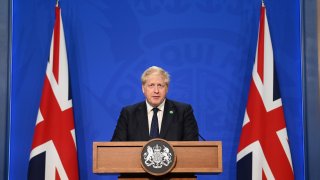
- The government is hosting its first ever Global Investment Summit on Tuesday in a bid to convince the world's largest international investors to pump money into the U.K.
- The summit comes at a tricky time for the U.K. which is facing a slew of economic crises, including labor shortages, record-high natural gas prices and supply chain constraints.
LONDON — The British government has secured £9.7 billion ($13.4 billion) of new foreign investment, as Prime Minister Boris Johnson looks to reverse the post-Brexit freefall in financing.
The government is hosting its first ever Global Investment Summit on Tuesday in a bid to convince the world's largest international investors to pump money into the U.K.
Johnson will be hoping to bolster support for his government's "Global Britain" agenda in the wake of Brexit, with foreign direct investment into the U.K. having nosedived since the country voted to leave the EU in 2016.
Feeling out of the loop? We'll catch you up on the Chicago news you need to know. Sign up for the weekly Chicago Catch-Up newsletter here.
The summit comes at a tricky time for the U.K. which is facing a slew of economic crises, including labor shortages, record-high natural gas prices and supply chain constraints.
The IMF has also forecast that the British economy will suffer the most of any G-7 nation following the coronavirus pandemic, remaining 3% below its pre-2020 trajectory in 2024 while other countries return to their expected growth levels.
Gates, Solomon and Dimon
Money Report
A substantial portion of the event's guest list hails from the U.S., including Bill Gates, Goldman Sachs CEO David Solomon, JPMorgan boss Jamie Dimon and Blackstone CEO Stephen Schwarzman.
Central to the backdrop of Tuesday's event is a cooling off of transatlantic talks, after Johnson's government touted a potential trade deal with the U.S. as a flagship component of its post-Brexit policy agenda.
According to Downing Street, the 18 deals already secured will lead to the creation of least 30,000 jobs and drive funding for key sectors such as hydrogen energy, sustainable housing and carbon capture and storage.
"This is just the start. We will see new partnerships for green growth forged at today's Global Investment Summit, as we look ahead to COP26 and beyond," Johnson said in a statement.
The U.K.'s Department for International Trade has also launched a new online platform for international investors to identify opportunities in England, Scotland, Wales and Northern Ireland.
The "Investment Atlas" will offer 53 strategic investment opportunities, including offshore wind substructures in Scotland and manufacturing ports in the northeast of England.
Market force
In his address to the conference on Tuesday, Johnson said that as the first nation to industrialize, Britain now has a responsibility to "set an example" on tackling climate change. He added that leaning into hydrogen and nuclear energy would provide long-term benefits.
"There is a force out there that is stronger than government, actually a force out there that is stronger even than business, represented by the $24 trillion in this room, and that force is consumer choice. That force is the market, and the market is going green," Johnson said, addressing concerns that his government was moving too fast on transitioning to green energy.
"People know that we have the technological solutions to these problems, and they want to go green."
He also stressed the importance of turning the "green industrial revolution" into sustainable economic growth. It comes after a total of 13 energy companies have gone out of business since the recent spike in energy prices in the U.K.
Dambisa Moyo, an economist and author who serves on the boards of Chevron, Condé Nast and the 3M Company, said the £9.7 billion announced prior to the summit was indicative of interest in the U.K., despite the choppy economic waters ahead.
"On a relative basis, the U.K. remains in a much better place in terms of the rollout of the vaccine, you've got high percentages of people that are vaccinated, contrary to many other places around the world, and I think that is going to be a real calling card going forward," Moyo told CNBC's Geoff Cutmore.
She suggested that life sciences and technology, such as the semiconductor industry in particular, offer openings that the U.K. could step into.






